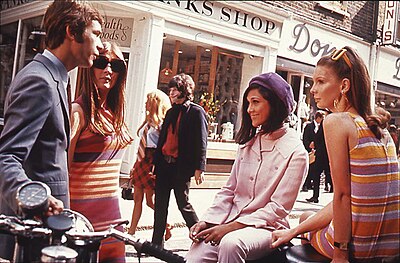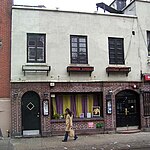The 1960s Portal
The 1960s became synonymous with the new, radical, and subversive events and trends of the period. In Africa the 1960s was a period of radical political change as 32 countries gained independence from their European colonial rulers. Some commentators have seen in this era a classical Jungian nightmare cycle, where a rigid culture, unable to contain the demands for greater individual freedom, broke free of the social constraints of the previous age through extreme deviation from the norm. Christopher Booker charts the rise, success, fall/nightmare and explosion in the London scene of the 1960s. However, this alone does not explain the mass nature of the phenomenon. Several nations such as the U.S., France, Germany and Britain turned to the left in the early and mid 1960s. In the United States, John F. Kennedy, a Keynesian and staunch anti-communist, pushed for social reforms. His assassination in 1963 was a stunning shock. Liberal reforms were finally passed under Lyndon B. Johnson including civil rights for African Americans and healthcare for the elderly and the poor. Despite his large-scale Great Society programs, Johnson was increasingly reviled by the New Left at home and abroad. The heavy-handed American role in the Vietnam War outraged student protestors across the globe, as they found peasant rebellion typified by Ho Chi Minh and Che Guevara more appealing. Italy formed its first left-of-center government in March 1962 with a coalition of Christian Democrats, Social Democrats, and moderate Republicans. Socialists joined the ruling block in December 1963. In Britain, the Labour Party gained power in 1964. In Brazil, João Goulart became president after Jânio Quadros resigned. This is a Featured article, which represents some of the best content on English Wikipedia..
On June 5, 1968, Robert F. Kennedy was shot by Sirhan Sirhan at the Ambassador Hotel in Los Angeles, California, and pronounced dead the following day. Kennedy, a United States senator and a leading candidate in the 1968 Democratic Party presidential primaries, won the California and South Dakota primaries on June 4. He addressed his campaign supporters in the Ambassador Hotel's Embassy Ballroom. After leaving the podium, and exiting through a kitchen hallway, he was mortally wounded by multiple shots fired by Sirhan. Kennedy died at Good Samaritan Hospital nearly 25 hours later. His body was buried at Arlington National Cemetery. (Full article...)This is a Good article, an article that meets a core set of high editorial standards.
Madhouse on Castle Street is a British television play, broadcast by BBC Television on the evening of 13 January 1963, as part of the Sunday Night Play strand. It was written by Evan Jones and directed by Philip Saville. The production featured the young American folk music singer Bob Dylan, who soon became a major musical star. The play was made with electronic video cameras, although recorded onto film rather than tape. The only known copy of the play was junked in 1968, as was the standard practice of the time, despite the fact that Dylan and lead actor David Warner were by then famous. Although extensive searches have been made by the BBC, only partial audio recordings of four songs sung by Dylan survive. (Full article...)Selected picture - In the 1960s, Carnaby Street in London was the center for trends and fashions.
Did you know -
Related portalsThis is a Featured article, which represents some of the best content on English Wikipedia..
Malcolm X (born Malcolm Little, later el-Hajj Malik el-Shabazz; May 19, 1925 – February 21, 1965) was an African-American revolutionary, Muslim minister and human rights activist who was a prominent figure during the civil rights movement. A spokesman for the Nation of Islam (NOI) until 1964, he was a vocal advocate for Black empowerment and the promotion of Islam within the African-American community. A posthumous autobiography, on which he collaborated with Alex Haley, was published in 1965. Malcolm spent his adolescence living in a series of foster homes or with relatives after his father's death and his mother's hospitalization. He committed various crimes, being sentenced to 8 to 10 years in prison in 1946 for larceny and burglary. In prison, he joined the Nation of Islam, adopting the name Malcolm X to symbolize his unknown African ancestral surname while discarding "the white slavemaster name of 'Little'", and after his parole in 1952 quickly became one of the organization's most influential leaders. He was the public face of the organization for 12 years, advocating Black empowerment and separation of Black and White Americans, and criticizing Martin Luther King Jr. and the mainstream civil rights movement for its emphasis on non-violence and racial integration. Malcolm X also expressed pride in some of the Nation's social welfare achievements, such as its free drug rehabilitation program. From the 1950s onward, Malcolm X was subjected to surveillance by the Federal Bureau of Investigation (FBI). (Full article...)This is a Good article, an article that meets a core set of high editorial standards.
Keith Richards (born 18 December 1943) is an English musician, songwriter, singer and record producer who is an original member, guitarist, secondary vocalist, and co-principal songwriter of the Rolling Stones. His songwriting partnership with the band's lead vocalist Mick Jagger is one of the most successful in history. His career spans over six decades, and his guitar playing style has been a trademark of the Rolling Stones throughout the band's career. Richards gained press notoriety for his romantic involvements and illicit drug use, and he was often portrayed as a countercultural figure. First professionally known as Keith Richard, by the early 1970s he had fully asserted his family name. Richards was born in and grew up in Dartford, Kent. He studied at the Dartford Technical School and Sidcup Art College. After graduating, Richards befriended Jagger, Bill Wyman, Charlie Watts, Ian Stewart and Brian Jones and joined the Rolling Stones. As a member of the Rolling Stones, Richards also sings lead on some Stones songs. Richards typically sings lead on at least one song a concert, including "Happy", "Before They Make Me Run", and "Connection". Outside of his career with the Rolling Stones, Richards has also played with his own side-project, The X-Pensive Winos. He also appeared in two Pirates of the Caribbean films as Captain Teague, father of Jack Sparrow, whose look and characterisation was inspired by Richards himself. (Full article...)Selected article -"Garota de Ipanema" (Portuguese pronunciation: [ɡaˈɾotɐ dʒipɐ̃ˈnemɐ]), "The Girl from Ipanema", is a Brazilian bossa nova and jazz song. It was a worldwide hit in the mid-1960s and won a Grammy for Record of the Year in 1965. It was written in 1962, with music by Antônio Carlos Jobim and Portuguese lyrics by Vinícius de Moraes. English lyrics were written later by Norman Gimbel. The first commercial recording was in 1962, by Pery Ribeiro. The Stan Getz recording featuring the vocal debut of Astrud Gilberto became an international hit. This version had been shortened from the version on the album Getz/Gilberto (recorded in March 1963, released in March 1964), which had also included the Portuguese lyrics sung by Astrud's then husband João Gilberto. In the US, the single peaked at number five on the Billboard Hot 100, and went to number one for two weeks on the Easy Listening chart. Overseas it peaked at number 29 on the UK Singles Chart, and charted highly throughout the world. (Full article...)More Did you know (auto generated)
TopicsCategoriesWikiProjects
Associated WikimediaThe following Wikimedia Foundation sister projects provide more on this subject:
Discover Wikipedia using portals |
How Can We Help?





























Recent Comments